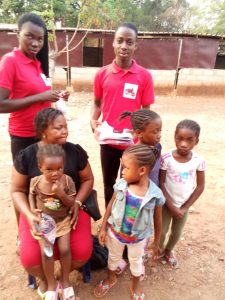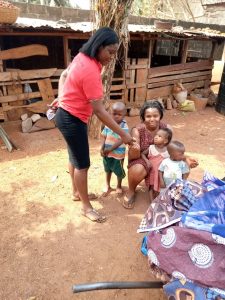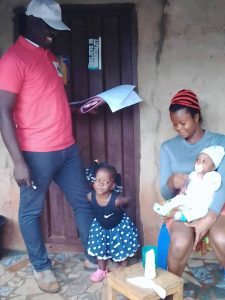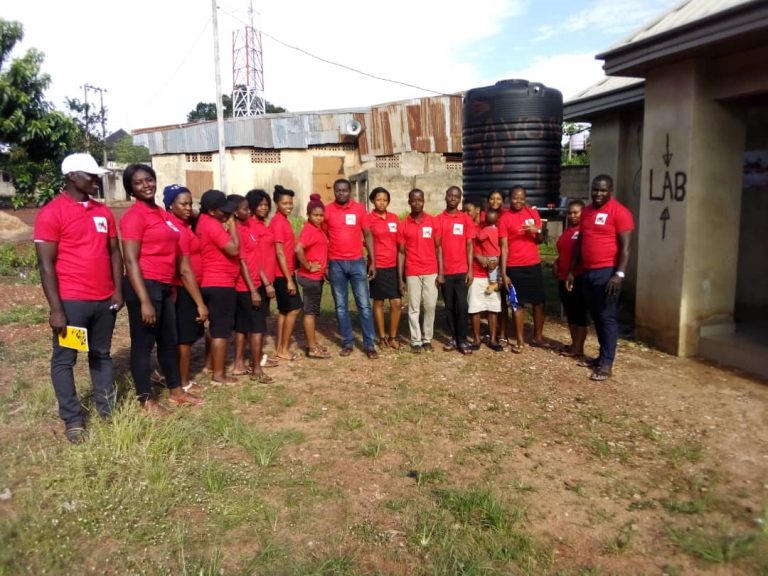This project is currently recruiting for the 2024-2025 cycle.
Background
Nigeria, the seventh most populous country in the world, has over half of its population living in
rural areas. These communities face significant healthcare challenges, exacerbated by high
poverty rates and the fact that medical expenses are paid out-of-pocket. Basic medical care is
often unavailable and unaffordable for most rural residents.
The prevalence of infectious and chronic diseases in Nigeria is alarming, with many preventable
deaths resulting from complications of malaria, diarrhea, respiratory infections, diabetes, heart
failure, pregnancy-related complications. In addition, a significant proportion of the population is
impacted by eye diseases and blindness. Vulnerable populations, such as children under five,
pregnant women, and seniors, are disproportionately affected.
The Nigeria Rural Primary Health Care Program (NRPHCP) is a critical initiative addressing these
challenges. It provides free, accessible, comprehensive, and longitudinal primary healthcare to
rural Nigerians, aiming to save lives and improve the quality of life for disadvantaged
communities. The NRPHCP focuses on relationship-based, community-centred care for the most
vulnerable populations as part of the Global Primary Health Care Program.
Program Overview
Program Provider: Oasis Community Health Foundation, a registered Nigerian nonprofit, in
collaboration with the Pacific Northwest Division of Family Practice, a Canadian nonprofit
organization of physicians.
Project Title: Nigeria Rural Primary Health Care Program (NRPHCP)
Medical Clinic Location: Amechi Uwani, Enugu State, Nigeria
Project Lead: Dr Odoh Onuora and Colleen Enns, Executive Director
Project Team: Physicians, nurses, lab technicians, students, patients, community members, and
other stakeholders.
Program website: www.ruralhealth.ca
Program email: info@ruralhealth.ca
Ongoing Core Projects:
1. Say No to Malaria Project
Malaria remains a leading cause of death in Nigeria, contributing to approximately 25% of global
malaria-related deaths annually. An African child under five dies every five minutes from malaria-
related conditions. Initiated in 2019, this project provides free community and clinic-based
malaria care, including:
– Treatment: Malaria diagnostic testing and treatment
– Prevention: Chemoprophylaxis and education.
2. Chronic Disease Management Project
Diabetes mellitus is a leading chronic disease in Nigeria, with many patients unable to afford the
required lifelong medications.
– This project offers free ongoing care, including screening and diagnostic testing, ongoing
consultations and care, medications, and counselling.
– The Chronic Disease Management Project also addresses other common conditions like
hypertension and congestive heart failure.
3. Maternal and Child Health Project
Nigeria ranks among the top three countries with the highest maternal mortality in Africa. Many
rural women, unable to afford hospital deliveries, face high maternal and neonatal death rates.
– This project provides free and standardized maternity and child health services, aiming to reduce maternal and infant mortality.
4. Let’s Stop Blindness Project
Blindness, often caused by glaucoma and diabetic retinopathy, is prevalent in rural communities
where access to eye care is limited.
– This project delivers free eye exams, treatment, and education to prevent blindness and
improve quality of life.
5. Other Activities
– School health programs, vaccinations, deworming program, and health education
– Dental education and care
– Community outreach and home health checks.
– Walk-in clinics for acute and chronic medical conditions
Benefits of Participation as a Student
Joining the NRPHCP offers an unparalleled opportunity to make a tangible impact in underserved
communities. Participants will:
– Be part of a global health initiative: Work in areas/projects where healthcare is most needed.
– Collaborate in a collegial, diverse, and innovative interdisciplinary team: engage with
professionals from diverse backgrounds to address complex health challenges.
– Pursue areas of interest
Customized opportunities include:
– Tropical disease research and treatment
– Chronic disease management using lifestyle and functional medicine
– Developing health educational materials (infographics, pamphlets, counselling guides)
– Exploring the socio-economic determinants of health in resource-poor settings
– Engage in research and quality improvement: contribute to projects that improve healthcare
delivery and patient outcomes.
-Technical support : Assist with updating the program’s website and other online/computer –
based technical support.
– Use the program for FLEX projects: Tailor the experience to align with your career goals and
passions.
The NRPHCP is more than a healthcare initiative—it’s a mission to create sustainable,
equitable, and innovative healthcare solutions in one of the world’s most vulnerable regions.
6. Malaria Control Project in Nigeria; Say No To Malaria in Amechi Uwani.
Project Supervisor: Dr. Onuora Odoh, Family Physician (practicing in Houston, BC)
Students’ Participation: Available virtually.
Malaria control project in rural communities in Nigeria is a grassroots community-driven malaria control project. The project is funded by the Rural Coordination Centre, BC as a Rural Global Health Initiative. The project started in October 2019 in Amechi Uwani; a rural community in Nigeria and the title is: Say No To Malaria in Amechi Uwani. The project aims to improve health and hope for rural Nigerians that are at most risk of developing severe malaria and dying from it through provision of free, accessible, sustainable, readily available, effective and evidence-based malaria prevention and early treatment programs. The project is led by Dr. Odoh Onuora and is in keeping with WHO Global Technical Strategy for Malaria and USAID/Presidential Malaria Initiative.
 Children less than 5 years and pregnant women in Amechi Uwani are visited at their homes every 3 months by trained project team members to provide malaria control education and administer prophylactic anti-malaria. Children up to 12 years of age that are sick and are suspected of having malaria visit the project’s designated Treatment Centre where microscopic blood film malaria test is conducted. Those with positive malaria test results are treated according to WHO guidelines. In addition to saving and improving lives, through this project, local data is being obtained on the process and effectiveness of routine malaria chemoprophylaxis for under 5 years old children and status of anti-malarial drug resistance in rural communities of Nigeria.
Children less than 5 years and pregnant women in Amechi Uwani are visited at their homes every 3 months by trained project team members to provide malaria control education and administer prophylactic anti-malaria. Children up to 12 years of age that are sick and are suspected of having malaria visit the project’s designated Treatment Centre where microscopic blood film malaria test is conducted. Those with positive malaria test results are treated according to WHO guidelines. In addition to saving and improving lives, through this project, local data is being obtained on the process and effectiveness of routine malaria chemoprophylaxis for under 5 years old children and status of anti-malarial drug resistance in rural communities of Nigeria.
Malaria is an infectious life-threatening disease transmitted by mosquitoes from person to person. It is a challenging global health problem with high risk of transmission across borders. While about half of the world’s population is at risk of malaria, 93- 94% (WHO 2018) of the cases and deaths occur in Africa. In 2018 alone, WHO reported about 228 million new cases, 405,000 new deaths and expenses of US$2.7 billion. People most vulnerable to severe malaria are children age 5 years and less, pregnant women and travelers from malaria non-endemic countries. About 70% of death from malaria occurs in children less than 5 years of age and is estimated that a child dies every 2 minutes from malaria in Africa.
 Nigeria has the highest malaria burden in the world. 25-30% of global malaria prevalence is contributed by cases from Nigeria. The WHO World Malaria Report of 2019 noted that, unlike most other high malaria-endemic African countries, Nigeria had an absolute increase in malaria prevalence in 2018 when compared to 2017. The report also stated that in 2018, less than 30% of pregnant women in Nigeria received WHO-recommended malaria prophylaxis in pregnancy and less than 30% of sick under 5-year-old children in Nigeria that sought malaria treatment in health facilities received malaria tests. About 11% of maternal death in Nigeria results from malaria.
Nigeria has the highest malaria burden in the world. 25-30% of global malaria prevalence is contributed by cases from Nigeria. The WHO World Malaria Report of 2019 noted that, unlike most other high malaria-endemic African countries, Nigeria had an absolute increase in malaria prevalence in 2018 when compared to 2017. The report also stated that in 2018, less than 30% of pregnant women in Nigeria received WHO-recommended malaria prophylaxis in pregnancy and less than 30% of sick under 5-year-old children in Nigeria that sought malaria treatment in health facilities received malaria tests. About 11% of maternal death in Nigeria results from malaria.
With globalization and frequent travels across borders, the risk of spread of malaria to countries it is rare is high. This makes malaria control a global health problem and priority. Canadians and citizens of other malaria non-endemic countries are at high risk of severe malaria and death from malaria because they lack immunity to malaria. Health professionals recommend malaria prophylaxis to Canadian travelling to malaria-endemic countries as malaria ranks high among tropical diseases diagnosed in returned Canadian travelers. Early diagnosis and appropriate treatment are paramount in preventing Canadians from having severe malaria and dying from it. Considering this, substantial knowledge of early diagnosis and treatment of malaria are necessary clinical skills for all Canadian medical students and health care providers.
By participating in the Nigeria Malaria Control Project, UBC students will gain life-saving clinical skills required to stop globalization of malaria. Other benefits of participating are:
 -Active involvement in grassroots and global rural community health project
-Active involvement in grassroots and global rural community health project
-Gain practical knowledge of clinical features of malaria, diagnosis, treatment, and prevention.
-Gain useful knowledge of socio-economic determinants of malaria and similar tropical diseases.
-Participate in research, disease surveillance and mapping activities
-Participate in developing useful and achievable strategies for rural community-based disease control project
-Develop skills and experience necessary for promoting and advocating for global health initiatives and health equity for all.
The Say No To Malaria in Amechi Uwani team is working with a local charity organization called Rural Primary Health Care Improvement Foundation to develop and implement strategies to improve, sustain and expand community-wide healthcare projects in the town. In addition to malaria control, other projects the group is working on are routine deworming and vitamin A supplementation program for children per WHO recommendation, management of common local chronic diseases and safe pregnancy care.
If you are interested in knowing more about this GHI project, contact Dr. Onuora Odoh at nicod.prayer4sure@yahoo.ca
